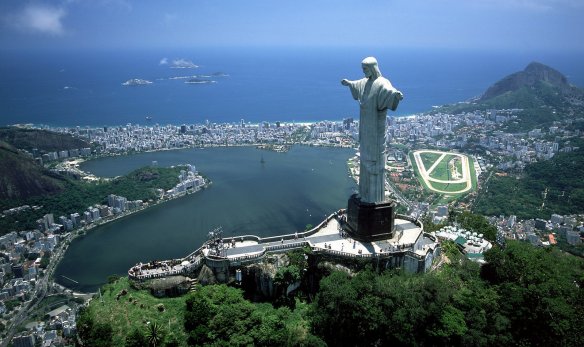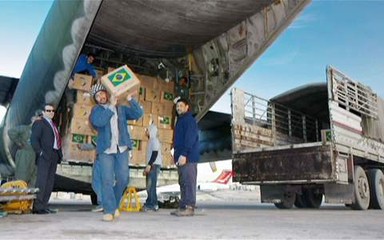
Aerial view of Christ the Redeemer and Rio de Janeiro. PHOTO: CC BY 2.0 / Sam Valadi
While the Norwegian overseas aid budget has been debated intensely here at home, Crown Prince Haakon was recently on an official visit in Brazil, from 16-19 November. Brazil is unquestionably the largest recipient of Norwegian aid, while simultaneously donating aid itself to poorer countries. This paradoxical situation tells us much about our changing world and Brazil’s ambitions for great power status.
Norwegian Aid to Brazil
Over the past five years, Norway has given over NOK 6.5 billion in aid to Brazil. Most of this aid has gone towards environmental measures. When Norway’s minister of climate and environment, Ms Tine Sundtoft, visited Brazil in September, she could confirm with pride that from 2009 to 2015, Norway had fulfilled its obligation to donate NOK 6 billion to the Amazon Fund.
This collaboration between Norway and Brazil has been both innovative and successful. Innovative because Norway pays by results. If Brazil had not succeeded in reducing deforestation in the Amazon, there would have been no money. Successful because we have contributed politically, economically and symbolically to Brazil’s success in reducing the annual rate of deforestation in the Amazon by 75 per cent over the past decade. In doing so, Brazil has succeeded in cutting 3 billion tonnes of carbon dioxide from its greenhouse gas emissions. This amount is equivalent to approximately 60 times Norway’s annual emissions. We do not yet know the fate of this collaboration from 2016 onwards, but the Norwegian government’s warnings of budget cuts are a cause for concern. It would be a tragedy if Norway did not continue to support the world’s most successful initiative to tackle climate change.
Brazil is Not Unique
There is nothing either new or exceptional about a country being – simultaneously – both an aid recipient and an aid donor. Norway is a good example. We were still receiving Marshall Plan aid from the United States when we started to send fishing vessels and Norwegian fisheries expertise to Kerala in South India in 1952.
Today we see that all the world’s so-called “emerging” economies are providing emergency relief and aid outside their own borders. This applies to all of the BRICS countries: Brazil, Russia, India, China and South Africa. And it also applies to many slightly smaller countries, such as Turkey, Indonesia and Saudi Arabia.
The Motivation – More Similar than we Think
But why are these countries providing aid? Part of the motivation is of course the humanitarian imperative, just as it is for Norway: one must help people in need. At the same time, these countries – like Norway – see their aid as a means to an end: they want to achieve something.
China is the most obvious example. China wants influence and access to natural resources such as oil and minerals. Saudi Arabia has perhaps the most clear-cut religious agenda. Among other things, Saudi Arabia is directing major resources to build mosques for refugees from Syria.
Aid as a Means of Boosting Power
Brazil wants to be taken seriously. To use a Brazilian expression, Brazil wants to be seen as um país sério – a serious country. We have just been to Brazil to research Brazilian aid, and one thing was clear: Brazil wants to be a great power. Its wet dream is a permanent seat in the UN Security Council.

Brazilian aid being unloaded from a plane.
If a country does not have sufficient military or economic muscle to make its voice heard in the world, it must turn to other means. And this is where aid and humanitarian relief come into play. A key person in Brazil’s foreign aid bureaucracy put it bluntly: “Aid is a tool in Brazilian foreign policy.” Brazil will contribute in order to be heard.
Significant Differences
Despite similarities in the reasons for giving aid, Brazilian aid is in many ways significantly different from that provided by Norway and other European countries. Brazil is crystal clear that it doesn’t want to be a donor, but a partner. Everyone we talked to felt the need to emphasize this particular point. This ambition comes to expression in the fact that Brazil sends very little aid in the form of cash to other countries. Brazil sends foodstuffs to relieve famines, but mostly it provides knowledge, experience and guidance on policy, generally by dispatching state employees abroad to train others. The Brazilians we spoke to also insisted that they don’t only give, they also get a lot in return, in the form of new and shared experiences. In its own view, Brazil’s own status as an aid recipient is a major advantage, as it means that there is less distance between donor and recipient.
Brazilian aid is very fragmented. There are no strategies or shared planning; there is no body like Norad to coordinate and evaluate contributions. Instead, over 100 state bodies run their own projects, without any real coordination. In addition, Brazilian non-governmental organizations are as good as absent. It is quite simply impossible to apply state resources to assist in efforts by non-governmental organizations abroad, and the Brazilian authorities don’t show any noticeable interest in doing so. In our opinion, these are clear weaknesses in Brazil’s engagement.
Economic Growth – now Crisis
Brazilian aid is in a state of change. After eight years of economic growth and of expansive foreign and overseas aid policies under president Lula da Silva, the more domestically oriented Dilma Rousseff is now in power. And the economy is in crisis. This has lead to severe cuts in the overseas aid budgets over the past two-to-three years, and to a change of emphasis from the humanitarian, healthcare and agricultural sectors to trade and commercial cooperation. Nonetheless: Brazil continues to make an international contribution.
During his visit to Brazil, Crown Prince Haakon visited a project supported by Norwegian overseas aid through the Amazon Fund. He also encountered a country that is itself giving billions in overseas aid. This is a paradoxical situation, although only in the sense that it is apparently self-contradictory. Fundamentally, Brazil is not doing anything different from Norway. The country is using its limited resources to get the greatest possible return. In foreign policy, this means giving in order to be heard.
- This text was published in Norwegian 16 November 2015 in Dagsavisen: Bistandsparadokset Brasil
- Translation from Norwegian: Fidotext